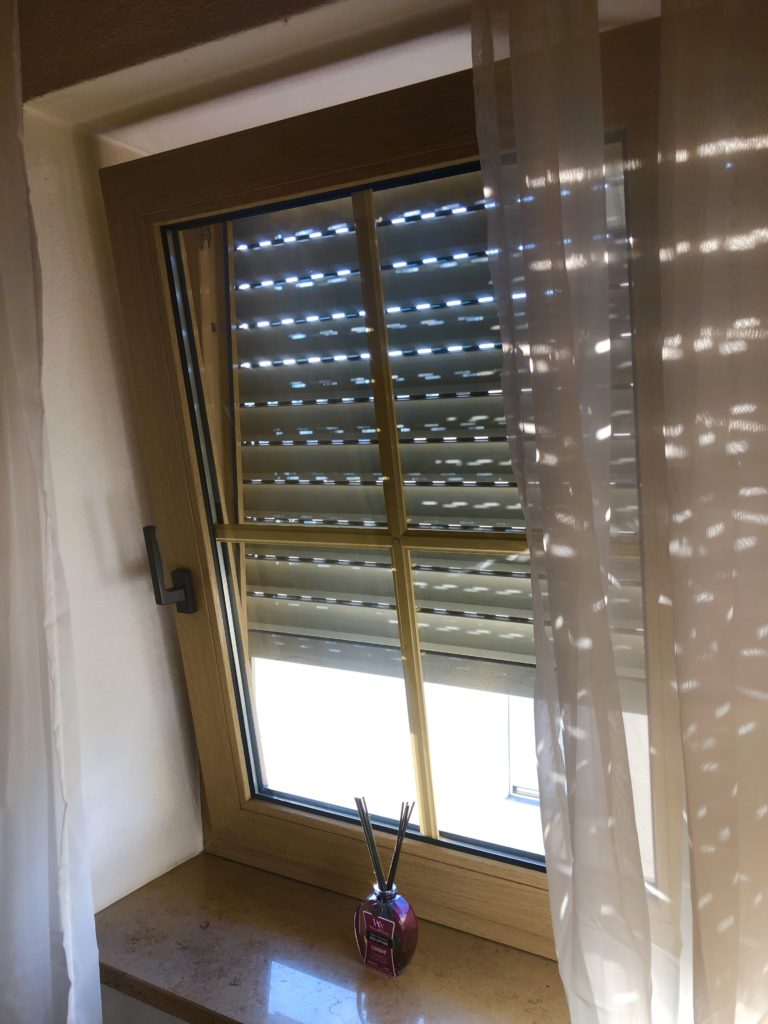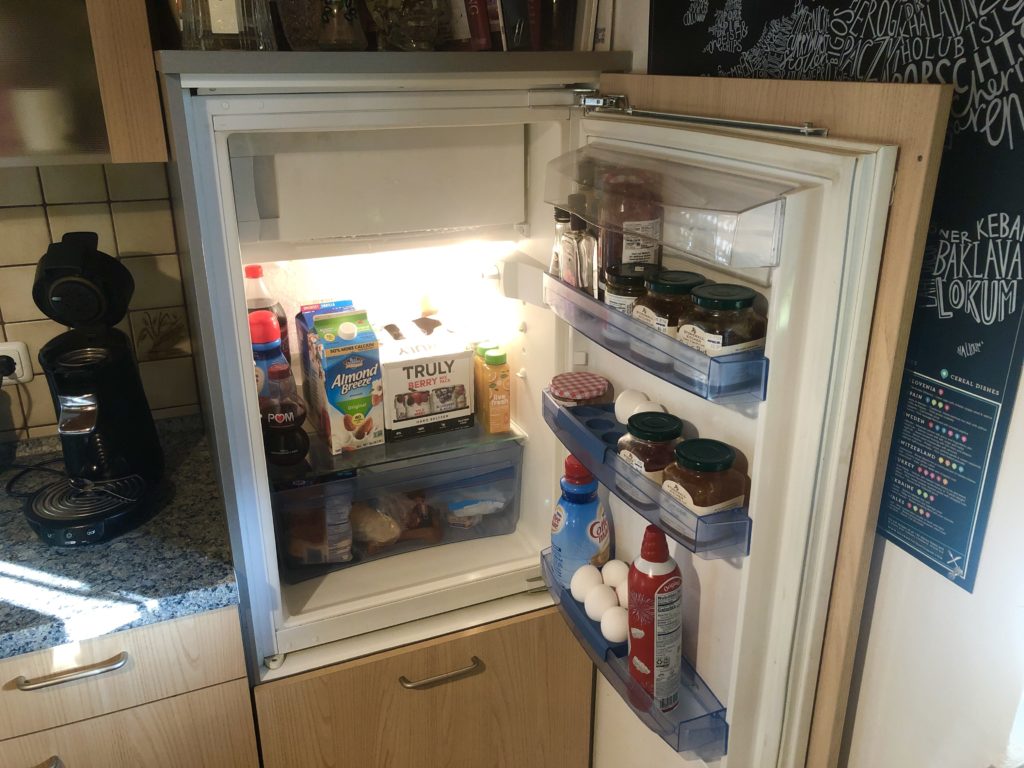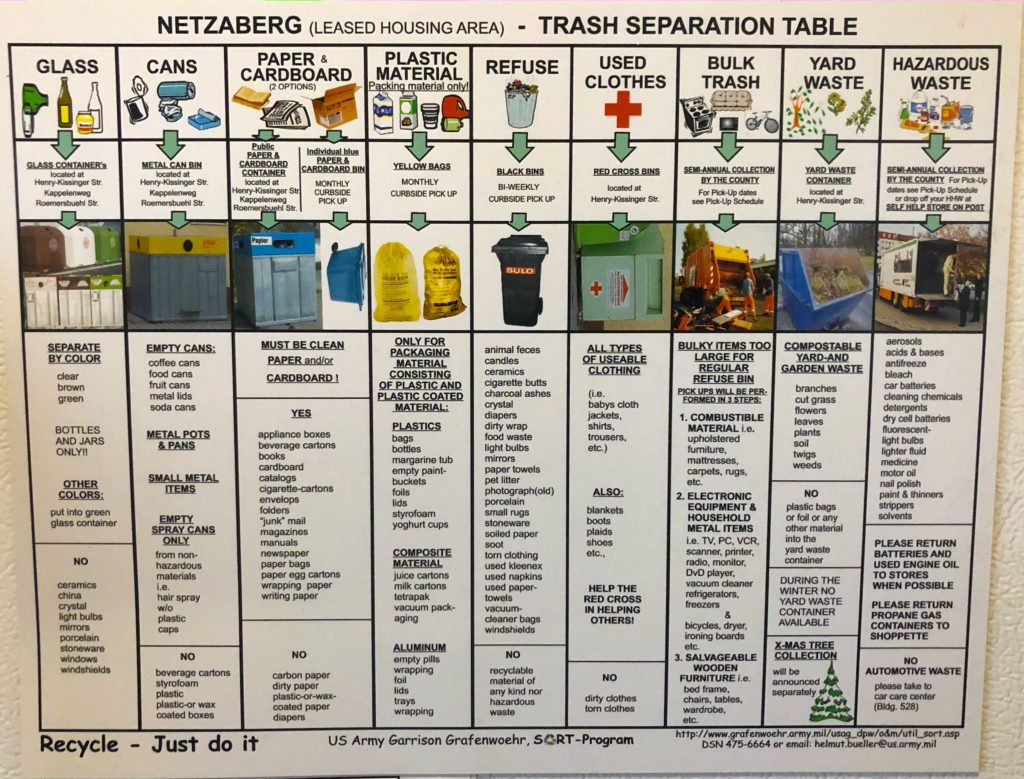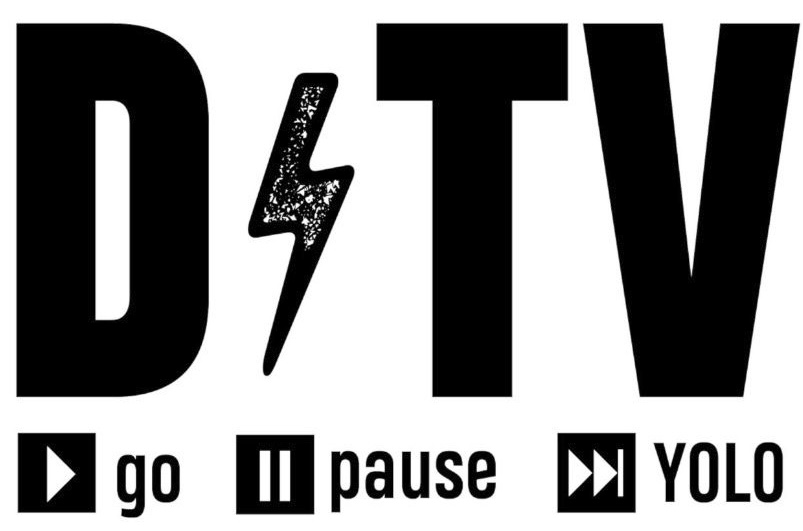Recycling, quiet restaurants, paying for the bathroom, peeing on the side of the road…there’s a lot to adjust to when you move to Germany! Some of it is easy, other things require more rules. But one thing is for sure: everyone experiences German culture shock when they PCS.
We’ve outlined some of the biggest changes you’ll notice and recommendations on how to adjust!
Home Comforts ||| Sizes /// Daily Life ||| Traveling /// Driving and Car Care
Home Comforts
German homes – even government housing – are noticeably different from American houses.
One of the best things by far is the rolling shades, aka rolladens. Whether they’re electric or manual, they’re built into the frame outside your window.

They’re like a combination of blinds and black-out shades. When you roll them down, you can either leave them partially open for some light, or roll them all the way down so that no light gets through. They’re amazing, especially during the summer when the sun rises before you want to wake up.
And speaking of windows, the German windows open two ways: canted (kippen) or completely open. (Some of the doors will work this way, too!) It’s a little confusing at first to figure out how to turn the handle to open the way you want, but it’s a really nice way to moderate the fresh air into your home.
Last but definitely not least: there’s no air conditioning. And that’s something you’ll notice almost everywhere you go in Europe. A/C just isn’t common.
This can make for a really difficult adjustment period if you’re PCSing during the summer. But people have lived without A/C for hundreds of years – you’ll adjust!
Pro tip: when you first wake up, open all your windows to let the cool air circulate. Close your windows later in the morning and roll own the rolladens to keep the cool(ish) air inside!
Sizes
Everything is smaller in Germany except for the beer!
Perhaps the first adjustment you need to make is to the small, built-in refrigerators. Because you won’t have much space, you may need to shop more frequently and buy less at a time. For example, if you keep lots of sauces in your fridge, you probably won’t have space for a week’s worth of meats.
Buy fresh produce, meats, dairy, and bread at your local farmer’s market!

And don’t even think about freezing them for very long – your “freezer” is a cubbyhole. It can probably hold two ice trays and a few ice cream sandwiches. I’m not joking.
So you may need to grocery shop a few times a week. But you also don’t need to refrigerate everything. For example, you can leave your eggs on the counter!
If you have the space in your home, you’ll be able to borrow an American-size fridge from the housing department.
For everything you need to know about housing in Germany, check out our guide!
Another size difference is the roads. The lanes may feel more narrow and you’ll notice the cars are smaller, too. But more on driving in a bit.
Daily Life
We have so many small, daily habits we have that we may not realize. But when the German culture shock sets in, you’ll quickly learn to change!
Sundays
In those first few weeks, you will undoubtedly forget that the grocery stores are closed on Sundays. In fact, almost everything will be closed. And on Saturdays, many shops will close around 2 or 3pm.
Sundays also have quiet hours, which means there are some things you just can’t do. For example, you can’t mow your lawn. And in case you forget, the neighbors will let you know.
At first it seems really inconvenient. You’re so used to doing whatever you want, whenever you want on the weekends. But after a while, it’ll become part of your routine, and you may find that Sundays become more relaxing!
Your local bakery might be open for a few hours, and the gas station will be open as well. So if you’re in desperate need of groceries…good luck! (But you can still go to the Commissary/BX.)
Cash
Speaking of shopping, always remember to bring cash. Period. Even if it’s a big chain or department store. I can’t tell you how many times people get to the IKEA checkout (yes, IKEA!) and hold up the line because they don’t have cash.
It’s rare that you’ll find a shop in Bavaria that accepts card. But you’ll find that cash transactions are pretty quick in Germany. You’ll really notice it when you’re waiting in the beer line at a fest. A cash transaction is much faster than waiting for someone to swipe and sign with a credit card!
You will also want to have a few coins on you as well to unlock the shopping carts. It may seem weird, but it’s a great incentive for people to return the carts, rather than leave them scattered throughout a parking lot.
Plus, coins are useful for public restrooms. And trust me, you want to use bathrooms with a fee. They’re much cleaner than any public restroom you’ll find in the US!
Restaurants
You may notice that there’s no music in German restaurants. And you notice it because everyone is so quiet compared to Americans. You won’t necessarily get kicked out for being loud, but you’ll definitely get some nasty looks from other guests.
And when you do go out, expect to be at dinner for 2 to 3 hours. Restaurants in Germany (and throughout most of Europe) aren’t trying to turn over tables. Which leads to my next point: waitresses will not check on you very often.
Sometimes there will only be one or two people serving the entire restaurant. If you need something, make eye contact with your server or politely ask entschuldigung (ent-SHOOL-dee-gung), which is similar to saying “excuse me.”
Also, a rookie mistake when you first arrive in Germany: water isn’t free! You won’t be greeted with tall glasses of free water, and certainly not with ice. If you ask for water, they will most likely bring you sparkling. So if you want bottled water, ask for mineralwasser or wasser ohne gas.
When you finally pay your tab (in cash), you need to ask the waitress for the bill, and you should definitely tip. A few euros is generally acceptable, but anything above 15 percent is out of the norm (though appreciated).
Another small but noticeable difference in tipping behavior: tell the server how much you’re paying including tip, rather than how much you want back.
For example, let’s say your bill comes to €35.50, and you want to tip €2.50. When you hand the server €40, you should say “38” instead of “Can I get 2 back?”
Get Our FREE Checklist! ✅
Recycling
While recycling is optional in the US, it’s required in Germany. And there are a lot of rules about it. Even the Germans can’t keep them straight!
Some apartments or houses may have recycling bins for cardboard and paper, but you’ll need to take your aluminum, plastic, and glass to recycling centers.
I recommend buying separate bins for your home to make sorting easy! And you’ll probably want to hang this recycling guide on your fridge (you can also get this from the housing office).

It may feel like a hassle in the beginning, but much like carrying cash or grocery shopping on Saturdays, it’s just a new habit you’ll develop. Plus, taking out the trash will be a little easier without glass bottles and cardboard boxes taking up so much space.
Learn all about how to recycle as an American living in Germany in our blog!
Personal Space
This may change after COVID-19, but Germans have a significantly smaller personal bubble than Americans. When you’re standing in line at Edeka, you might feel the person behind you breathing down your neck…literally.
And if you go to a fest or a zoigl stub’n, you might share a table with other customers. But you don’t have to make conversation.
Sharing tables is usually an issue of space. It’s polite to prost when you or they receive a fresh round of drinks, but otherwise people expect that you’ll stick to your own conversations.
Another thing to note about sharing tables: you can’t always save an entire table for your group. For example, if two of you show up at 18:00 and your other four friends are late, the zoigl stub’n may not let you save those four seats if there are other patrons looking for a table. So make sure the group arrives together!
Waiting in line, however, is a different story. You need to be assertive if you want to hold your place. In the US, it’s common for people to ask “Are you waiting in line?” if the situation is unclear (ex: the farmer’s market, a fest). Germans, however, may cut in front of you if you’re not paying attention.
If that happens, it’s acceptable to say entschuldigung and let them know that there’s a line.
Nudity and Other Taboos
It might shock you to see nipples and naked women on TV or the magazine stands. Germans are less prudish about nudity, so just be aware of it if you don’t want your kids browsing through naughty magazines.
But you won’t have to worry about them seeing naked people in person at the saunas! While the saunas and spas tend to be nude (kleidung frei), they’re also 18 and older (or sometimes 16 and up). You also may find some nude beaches as you travel throughout Europe, but those also tend to be for adults only.
It’s definitely a shock when you enter a nude space for the first time, so remember: don’t stare. It’s kind of an unspoken rule in these spaces. Once you start staring, it brings attention to the fact that everyone is…well, naked.
The same goes for wearing clothing in nude spaces. It brings attention to the fact that everyone else is naked. If you don’t want to be nude, then don’t go!
And speaking of staring, you might find a German staring at you when you’re clothed. In the US, if you catch someone staring at you, they’ll probably look around to avoid any awkwardness. But not the Germans. They’ll just keep staring.
The same goes for children. While an American parent might tell their kid it’s rude to stare, a German parent will let their kid stare to their heart’s content. Get used to it.
Another taboo you’ll also need to get used to is hearing swear words on the radio. German radio usually won’t censor lyrics, so if you’re not listening to AFN Bavaria, you might hear an occasional F-bomb or WAP…
Traveling
Of course you’re going to travel, and there are a few things you should know!
First, if you travel with a spouse and book a double bed, it may literally be two twin beds pushed together, with two separate comforters. On one hand, it’s great if one of you is a covers thief. On the other hand, it makes cuddling harder.
Plus, the rooms will be smaller. Don’t bring large suitcases – a backpack or small duffle bag should be enough for a long weekend.
Not sure where to go for the long weekend? Check out these popular destinations right outside base.
You’ll also notice how much easier and cheaper it is to travel! Planes are cheap and quick, but trains and buses can also be budget-friendly, too. Plus, if you buy your tickets from the desk at the train station, you can usually use your VAT form.
Definitely do your research before booking tickets. Sometimes a flight will be better for your schedule, whereas a train might be better for your budget. And sometimes driving is the best of both worlds.
Driving and Car Care
Americans love their cars and we love to drive. But as you noticed with your driver’s license exam, there are different rules here in more ways than one.
The most well-known example might be the autobahn. While some sections don’t have a posted speed limit, there are definitely speed limits around city centers. Always keep an eye out for signs while you’re driving!
When you’re not near a city, you’ll notice that some drivers – even in mini-vans – like to go fast. And if you’re not going their speed, they’ll warn you to get out of their way by flashing their headlights in your rearview mirror.
As a rule of thumb, stay in the right lane. The left lane is primarily for passing, and it’s extremely dangerous if you’re just cruising at 60 mph.
When it comes to car care, you may be better off taking your car to the car wash. You’re not supposed to wash your car outside – and the neighbors, again, will let you know.
Speaking of which, you also can’t leave your car running for longer than a couple minutes (neighbors will also remind you of this). It’s common in the US to turn your car on and let it warm up in the winter. But in Germany, that’s not allowed!
The same applies if you’re in bad traffic or waiting in a parking lot while your spouse shops. A general rule of thumb: if you don’t expect to move your car in the next minute, turn it off.
German Culture Shock Happens to Everyone
Moving to Germany means getting used to new things. Some things will be uncomfortable at first, but eventually you’ll learn to embrace a lot of the cultural changes!
And even if you mess up a thing or two, it’ll make for a great story down the line.
Still need some help PCSing to Germany? Download my Ultimate PCS Checklist!
RELATED VIDEOS







